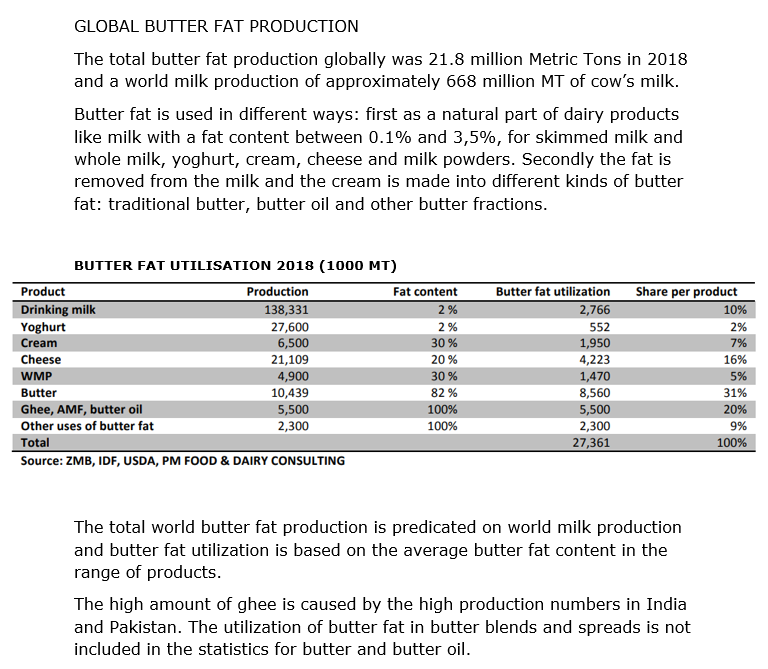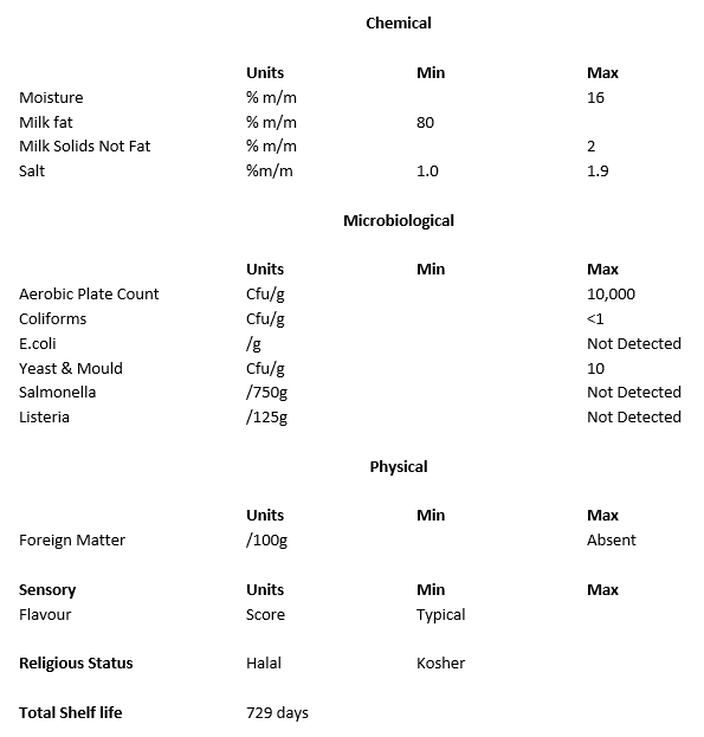SALTED BUTTER
Sweet cream salted butter is the main butter consumed in the United States as a spread and condiment and is commonly used to give a smooth, creamy texture to sauces. It is made by churning fresh cream and adding salt. The final product has a minimum of 80% fat content, 17% water and 1.6 to1.7% salt. Besides impoving tast, the salt also acts as a natural preservative.

Typical Compositional Analysis
The analysis results listed in this product bulletin are
typical. Refer to the selling specification for minimum
and maximum limits by parameter.
Milkfat (g/100g) 81.4
Moisture (g/100g) 15.7
Salt (g/100g) 1.5
Milk solids not fat (g/100g) 1.4
Typical Mineral Analysis
Sodium (mg/kg) 600
Potassium (mg/kg) 22
Calcium (mg/100g) 22
Iron (mg/100g) <0.2
Copper (mg/100g) <0.05
Typical Chemical Analysis
Free fatty acids as Oleic acid (%m/m) <0.3
Typical Nutritional Analysis
Energy (kJ/100g) 3030
Calories (kcal/100g) 725
Moisture (g/100g) 15.7
Protein (g/100g) 0.6
Total Fat (Milkfat) (g/100g) 81.4
Total Carbohydrate (g/100g) 0.6
Total Sugar (Lactose) (g/100g) 0.6
Dietary Fibre Nil
Cholesterol (mg/100g) 195
Ash (g/100g) 1.5
Fatty Acids (g/100g Product)
Saturated fatty acids 53.9
Mono unsaturated fatty acids 16.4
Poly unsaturated fatty acids 1.1
Trans1 fatty acids2 3.8
1 Methylene interrupted trans
2 Please refer to individual country regulations for trans fatty acid
labelling requirements
* * * * * * * *
Product Description
Salted Cream Butter is made from high quality fresh cream using world leading
butter making technology. Salted Cream Butter consistently delivers the superior
flavor and mouthfeel needed in many applications such as baked goods and spreads. It
also serves as an ingredient in a wide range of food products. Salted Cream Butter has
an excellent shelf life and maintains its fresh flavor well.
Product Characteristics
– Manufactured from pasteurized milk or cream.
– Is frozen after manufacture to preserve the
pure, clean and fresh flavour
– Salted Cream Butter is full of natural
goodness and contains no added ingredients other
than salt.
– Is produced in a sophisticated processing plant
to ensure product consistency.
– Light yellow colour and creamy taste have
benefits for both industrial processors and
consumers.
– Is microbiologically more stable than Salted
butter.
Packaging
Salted Cream Butter is available as a plastic wrapped
25 kg block, inside a cardboard outer. No
staples or metallic fasteners are used.
Net weight 25.0 kg
Gross weight 25.7 kg
Storage and Handling
Salted Cream Butter is a perishable food. In order to
preserve its pure clean flavour it should be:
– Kept frozen at -10°C to -25°C in accordance with
importing country requirements
– Kept away from odors.
– Kept out of direct sunlight.
– Used strictly in rotation.
Provided that the packaging remains intact and the
above storage conditions are followed, Salted
Cream Butter will have a shelf life of 24 months from
the date of manufacture.
* * * * * * * *
Compliance
– CODEX STAN 279
– Meets Halal requirements.
– Meets Kosher requirements
Suggested Labelling
Salted Butter or Butter
Allergens: Contains Milk and Dairy products x
Country regulations for product labelling vary.
Customers need to check local
regulations to determine the correct labelling of this
ingredient
Recommendations
It is the customer’s
responsibility to determine the suitability of the product
in its processing and final applications.
Vitamins
Total Vitamin A (g retinol/100g) 862
Vitamin E (mg/100g) 3.0
Vitamin C (mg/100g) <0.1
Typical Physical Properties
Colour Uniform, Pale Yellow
Flavour & Odour Pure, Clean, Cream
Body Uniform, Plastic
Texture Fine, Close
Typical Melting Point 33°C
Typical Microbiological Analysis
Listeria (/125g) Absent
Salmonella (/750g) Absent
Refer to product selling specification for specific
microbiological limits.
Quality Assurance
Strict quality control procedures are enforced during
manufacture. The manufacturing environment is also
subject to regular monitoring and control.
Product is Pasteurised
Final product is sampled and tested for chemical,
sensory and microbial parameters using internationally
recognized procedures.
During storage and shipment, precautions are taken to
ensure that the product quality is maintained. Each
package is identified, enabling trace back.





